Intent:
At the Federation of Longhorsley and Whalton C of E Schools, we aim to develop the children’s love of reading that continues throughout their school days and beyond. We believe that being a successful reader opens the door to the rest of the curriculum.
Through reading in particular, children have a chance to develop culturally, emotionally, intellectually, socially and spiritually. Literature, especially, plays a key role in such development. Reading also enables our children both to acquire knowledge and to build on what they already know. (Primary National Curriculum 2014)
Reading for pleasure
Staff read to children every day in school from a range of high quality texts. We use texts from The Pie Corbett Reading Spine, which is a core of books that create a living library inside a child’s mind. In addition to a range of diverse texts, it is a store of classics and essential reads that help children engage at a deeper level and enter the world of the story as well as learning about the diverse cultures of British society, as well as learning about the diverse cultures of British society.
How we teach reading
We follow the Primary National Curriculum’s programmes of study for reading at key stages 1 and 2 which consists of 2 dimensions:
- word reading
- comprehension (both listening and reading)
Phonics
Phonics Teaching Across The Federation
Teaching Phonics is a way of teaching children to read quickly and skilfully. They are taught how to:
- recognise the sounds that each individual letter makes
- identify the sounds that different combinations of letters make – such as ‘sh’ or ‘oo’
- blend these sounds together from left to right to make a word
Children can then use this knowledge to read new words they hear or see. This is the first step in learning to read.
How do we teach Phonics?
We use Read Write Inc. (RWI) Phonics, developed by Ruth Miskin (a DFE accredited systematic synthetic phonics programme). This programme provides a structured and systematic approach to the teaching of phonics. It is taught daily in Reception and Key Stage 1 and can be used as a support tool in Key Stage 2. Already we have seen accelerated progress in children’s reading and writing which has led to a greater investment in resources and staff training to build further onto the success of this programme.
Please click on this link for more information for parents on RWI.
What is the Phonics Screening Check?
The Phonics Screening Check is a quick and easy check of each child’s phonics’ knowledge at the end of Year 1. It helps our school to confirm whether a child has made the ‘expected’ progress. The statutory check usually takes place in the first 2 weeks of June.
Click this link for the current year’s test dates.
The Phonics Screening Check is a list of 40 words (some real words and some non-words) that children read one-to-one with a teacher. Children may have read some of the words before, whilst others will be completely new. Non-words are important to use because words such as ‘jap’ or ‘jound’ are new to all children and therefore cannot be read by memory. The check normally takes just a few minutes to complete and there is no time limit. If a child is struggling, the teacher will stop the check. Children who have not met the standard in Year 1 will retake the Phonics Check in Year 2. Please see your child’s class teacher if you require more information about Phonics and the Screening Check.
Literacy Tree
Literacy tree is a complete, book-based platform. The books we choose help children to grow ideas and expand their minds. We only choose significant and important children’s literature to cover in our English lessons. The children become immersed in these wonderful texts and link this to their writing.
Home Reading
We expect the children to read a minimum of 3 times a week. Books should be read a few times to aid the child’s decoding skills, reading fluency and understanding and comprehension.
Read Write Inc Book Bag Books
Our children following the RWI phonics programme receive books that are matched to the current stage in their phonological development. These are called ‘Book Bag Books’ and cover all of the sounds taught in school.
PM Reading
Once children have completed the Read Write Inc phonics programme, they move onto the PM reading scheme. PM is the largest and most finely levelled reading programme in the UK, with a pedagogically sound, proven approach to making every child a successful, balanced reader.
The PM collection contains over 1000 carefully levelled fiction and non-fiction texts, organised by series strand and by colour band. These books challenge the children at an appropriate level to develop their reading comprehension.
Common Exception Words
Children are also taught the common exception words, which they learn by sight. Common Exception Words
Our aim is for children to become fluent readers by the end of Key Stage One. This way, children can focus on developing their fluency and comprehension as they move through the school. By the end of each academic year, it is expected that:
In Year 1, children will read between 60 words of an age appropriate text in one minute.
In Year 2 children will read 90 words of an age appropriate text in one minute.
In Year 3 children will read 270 words of an age appropriate text in three minutes.
In Year 4 children will read 360 words of an age appropriate text in four minutes.
In Year 5 children will read 450 words of an age appropriate text in five minutes.
In Year 6, children will read extended texts at 120 words per minute (in line with end of KS2 testing).
Comprehension:
Children initially encounter reading comprehension within Read Write Inc. sessions at school. This is supplemented by work done in classes studying carefully chosen class texts. As children move on from the Read Write Inc. programme, they develop their comprehension skills through the Read Write Inc. comprehension scheme and then later within Literacy and Language.
We use guided reading cards from the PM reading scheme to develop a range of reading skills across a wide variety of text types.



